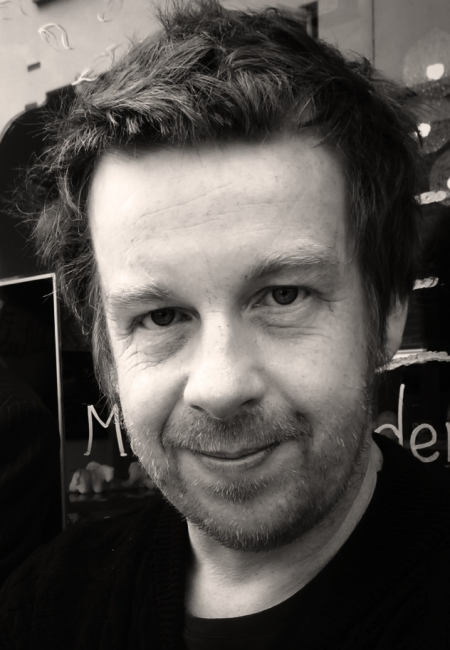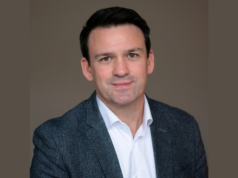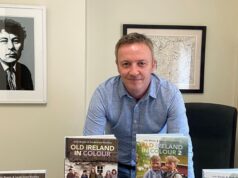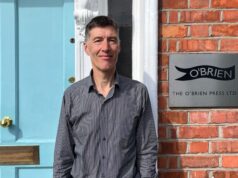
Interview by Mary McCarthy
The best research is done without realising it. I was a freelance journalist for 15 or 20 years and lived in many countries and you just kind of soak up the feelings of places and the kinds of atmospheres that might nudge you towards stories. My latest book is set in Spain, where I’ve spent a lot of time over the years, being entirely unaware I was researching a novel.
Most days my writing doesn’t seem to be going too well. One or two days a week I might feel like I’m making progress – but I know it’s during those other, blaa kind of days that all the essential composting takes place. The bad days are when the real writing is happening. There are no shortcuts.
I read my own audio books and I hope it adds another dimension for the listener. For the novel City of Bohane, I used the working class speech of Cork and Limerick, essentially, and was happy to discover it’s a very underused resource. It has a great natural musicality and belligerence.
Some short stories I write in a week or two, and others sit on the desk for years. My favourites tend to happen pretty quickly.
We struggle to read the way we used to. We don’t have the powers of concentration. We are scanning and skim reading so much online it’s difficult to get into the slower pace of a book. A novel tends to have to impress us quickly now. In the past I might read the first 80 pages before deciding if it was for me. Not anymore! You can’t disregard this fact as a writer, and stories are being told differently as a result. You have to lock the reader in much more quickly now.
I work with very black, very dark comedy a lot – I like to play with tone and the readers’ expectations.
When your phone is off, life slows down, time has more texture; it’s less fragmented. My wife and I try to turn off our devices around 7pm and I won’t turn mine on until I have allowed myself the blessed space of 2-3 hours work the next day. The internet sabotages my concentration and if I’m online I can’t write well.
I write for a few hours every morning. It’s easier when you’re still have half asleep to get into that kind of subconscious place, where stories happen. Even if nothing much is happening on the desk, I’ll sit there, I’ll wait it out. It’s part of the deal.
In my twenties I probably read too narrowly. I would have a phase where I’d read nothing except Flannery O’Connor or Saul Bellow or Philip Roth. If you want to write, you should read as broadly as possible.
Now I might have 20 books on the go on the bedside table at any given time. I won’t finish them all. Right now I’m re-reading Hilary Mantel’s Wolf Hall, and some Lucia Berlin short stories, some essays by Janet Malcolm and a collection of Orson Welles interviews.
I’ve had rave reviews and hatchet jobs. You do feel a bit cranky after a bad one and all warm and glowing after a good one. But you learn that these emotions are very, very temporary. Most writers are not being entirely honest if they say they take no notice of reviews. But you do start to care less.
Publishing and writing are very different worlds. Writers needs to focus on the story. If they think about what happens when the story leaves the house, it can get problematic. The danger for a writer is in trying to please the reader, or getting caught up in social media all the time, or thinking about literary awards, or press coverage, and all of these things are really part of the business of publishing, they’re nothing to do with the actual writing.
Acting has a lot in common with writing. In both professions you’re trying to create voices that sound believable, that you can get away with.
Experience is filtered through your perceptions and your senses to produce deep, subconscious notions that might make stories. I wouldn’t define experience too narrowly, it’s not just what’s happened to you, it can include everything you’ve read, the podcasts you’ve listened to, the TV and films you’ve watched.
I never took any creative writing courses, though they may well have been good for me. I don’t know how much they can teach about writing but if there is a benefit, it’s that these courses create a space for your writing.
It’s terrific to see so many new Irish writers emerging all the time. The visibility encourages others. Growing up in Limerick, Michael Curtin was the only real working novelist in town, and when there aren’t many examples around, it can seem like an unlikely thing to start attempting.
Kevin Barry’s latest book is Night Boat to Tangier.

Mary McCarthy
Mary McCarthy is a freelance journalist writing for a number of publications. She is an avid reader and an iron-willed book club administrator. @maryknowsbees











